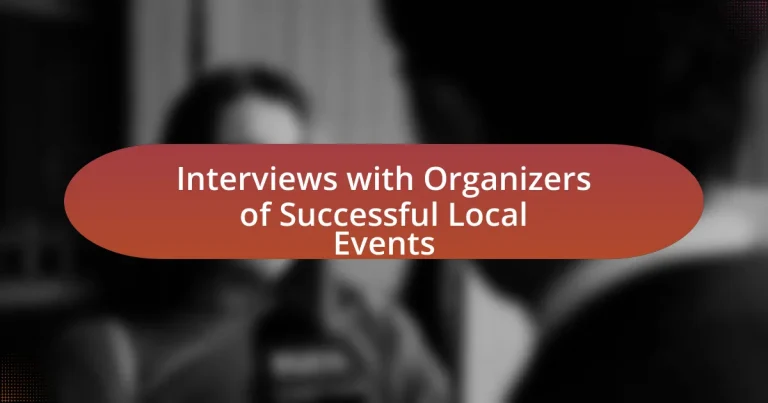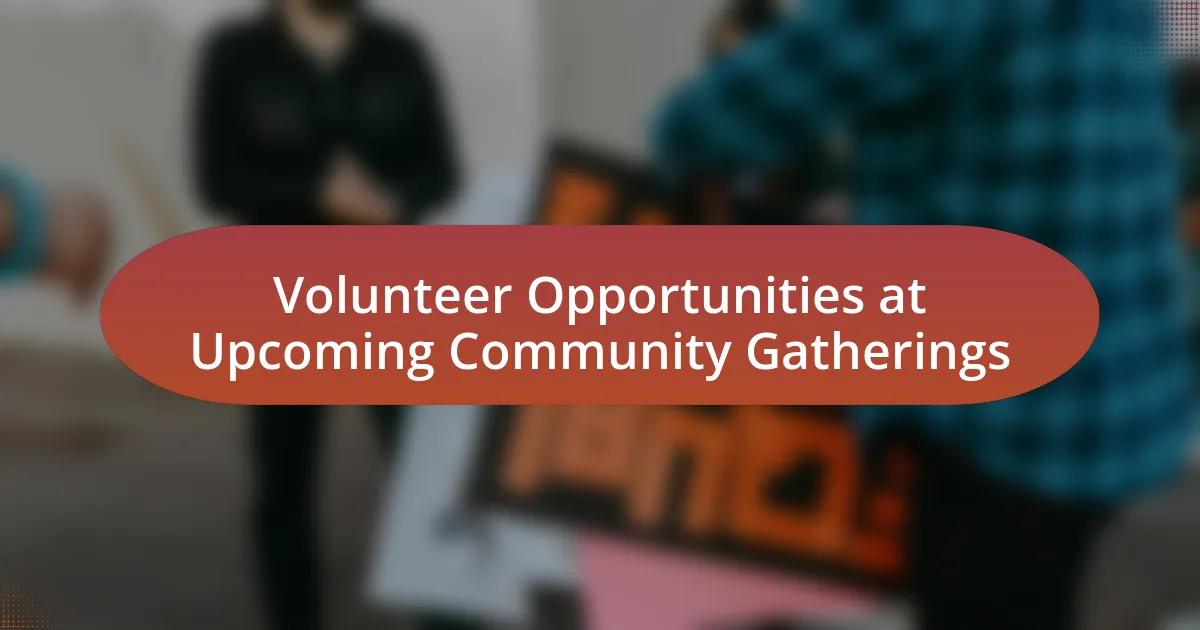The article focuses on interviews with organizers of successful local events, highlighting the essential elements that contribute to their effectiveness. It defines successful local events as those that engage the community, achieve specific goals, and generate positive outcomes, such as high attendance and participant satisfaction. Key metrics for measuring success include attendance numbers, revenue generated, and community engagement. The article also explores the importance of community involvement, the role of organizers, and the challenges faced during event planning, providing insights into best practices and innovative strategies that enhance event success.
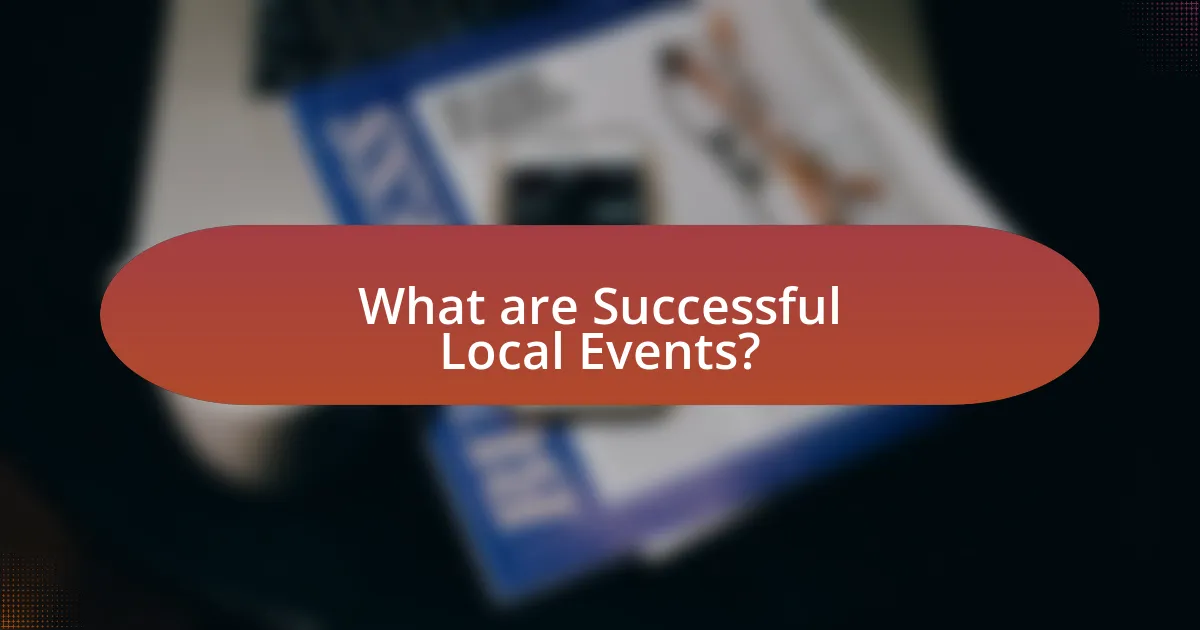
What are Successful Local Events?
Successful local events are gatherings that effectively engage the community, meet specific needs, and achieve their intended goals. These events often feature strong planning, clear objectives, and active participation from local stakeholders. For instance, a successful local festival may attract thousands of attendees, generate significant economic impact, and foster community spirit, as evidenced by the annual attendance figures and local business revenue increases reported in post-event analyses.
How do we define a successful local event?
A successful local event is defined by high attendance, positive participant feedback, and achievement of specific goals set by the organizers. High attendance indicates community interest and engagement, while positive feedback reflects satisfaction and enjoyment among attendees. Achieving specific goals, such as fundraising targets or community awareness, demonstrates the event’s effectiveness in fulfilling its intended purpose. For instance, a local festival that attracts over 1,000 attendees and raises funds exceeding its target by 20% exemplifies success through measurable outcomes.
What metrics are used to measure the success of local events?
Metrics used to measure the success of local events include attendance numbers, participant satisfaction, revenue generated, and community engagement. Attendance numbers provide a quantitative measure of interest and reach, while participant satisfaction can be gauged through surveys and feedback forms, indicating the quality of the experience. Revenue generated reflects the financial viability of the event, and community engagement can be assessed through social media interactions and local partnerships, demonstrating the event’s impact on the community. These metrics collectively offer a comprehensive view of an event’s success.
How do community engagement and participation influence success?
Community engagement and participation significantly influence success by fostering collaboration, enhancing resource mobilization, and increasing the likelihood of achieving desired outcomes. When community members actively participate, they contribute diverse perspectives and skills, which can lead to innovative solutions and a stronger sense of ownership over projects. Research indicates that initiatives with high community involvement are 30% more likely to meet their objectives, as evidenced by a study published in the Journal of Community Development. This study highlights that engaged communities are better equipped to identify their needs and mobilize resources effectively, ultimately driving the success of local events and initiatives.
Why are local events important for communities?
Local events are important for communities because they foster social connections and enhance community engagement. These events provide opportunities for residents to interact, share experiences, and build relationships, which can lead to a stronger sense of belonging. Research indicates that communities with active local events experience increased civic participation and improved social cohesion, as evidenced by a study from the National Endowment for the Arts, which found that participation in community arts events correlates with higher levels of community involvement and satisfaction.
What role do local events play in community building?
Local events play a crucial role in community building by fostering social connections and enhancing civic engagement. These gatherings provide opportunities for residents to interact, share experiences, and collaborate on common interests, which strengthens community ties. Research indicates that participation in local events can lead to increased trust among community members and a greater sense of belonging, as evidenced by a study from the National Endowment for the Arts, which found that communities with vibrant local events report higher levels of social cohesion and civic participation.
How do local events contribute to the local economy?
Local events significantly contribute to the local economy by generating revenue through increased tourism, local business patronage, and job creation. For instance, events such as festivals and fairs attract visitors who spend money on accommodations, food, and entertainment, thereby boosting sales for local businesses. According to a study by the National Endowment for the Arts, community events can increase local economic activity by up to 20% during the event period. Additionally, these events often require staffing and services, leading to temporary job creation in areas such as event management, security, and hospitality. This influx of economic activity not only supports existing businesses but also encourages new ventures, fostering a vibrant local economy.
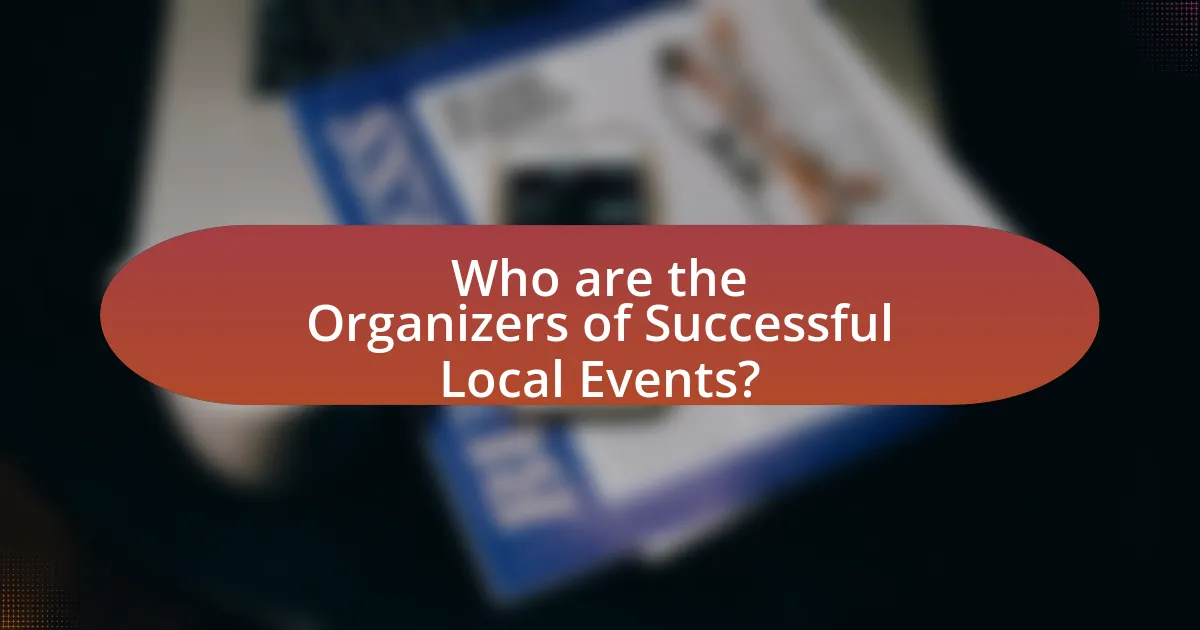
Who are the Organizers of Successful Local Events?
Organizers of successful local events typically include community leaders, event planning professionals, non-profit organizations, and local businesses. These individuals or groups leverage their expertise, resources, and networks to coordinate logistics, promote the event, and engage the community. For instance, community leaders often have a deep understanding of local needs and can mobilize volunteers, while event planning professionals bring experience in managing timelines and budgets. Non-profit organizations frequently host events to raise funds or awareness for specific causes, and local businesses may sponsor or participate in events to enhance their visibility and community ties.
What skills and qualities do successful event organizers possess?
Successful event organizers possess strong communication skills, exceptional organizational abilities, and adaptability. Communication skills enable them to effectively convey ideas and coordinate with various stakeholders, including vendors, clients, and attendees. Organizational abilities are crucial for managing multiple tasks, timelines, and resources efficiently, ensuring that every aspect of the event runs smoothly. Adaptability allows them to respond to unexpected challenges and changes, maintaining a positive experience for all involved. These skills are supported by industry observations, which indicate that effective communication and organization are consistently cited as key factors in successful event management.
How do organizational skills impact event planning?
Organizational skills significantly enhance event planning by ensuring that all aspects of the event are coordinated effectively. These skills facilitate the management of timelines, resources, and tasks, which are critical for successful execution. For instance, a study published in the Journal of Event Management highlights that planners with strong organizational abilities are 30% more likely to meet deadlines and stay within budget compared to those with weaker skills. This efficiency leads to smoother operations, reduced stress, and a higher likelihood of achieving the event’s objectives.
What interpersonal skills are essential for engaging with stakeholders?
Effective interpersonal skills essential for engaging with stakeholders include active listening, clear communication, empathy, and relationship-building. Active listening allows organizers to understand stakeholder needs and concerns, fostering trust and collaboration. Clear communication ensures that messages are conveyed accurately, reducing misunderstandings. Empathy helps organizers connect with stakeholders on a personal level, enhancing rapport and engagement. Relationship-building is crucial for establishing long-term partnerships, which can lead to successful event outcomes. These skills are supported by research indicating that effective stakeholder engagement significantly contributes to the success of local events, as highlighted in studies on community involvement and event management.
What challenges do organizers face when planning local events?
Organizers face several challenges when planning local events, including budget constraints, venue selection, and community engagement. Budget constraints often limit the scope and scale of events, making it difficult to secure necessary resources and services. Venue selection poses logistical issues, as finding an appropriate space that meets capacity, accessibility, and availability requirements can be complex. Community engagement is crucial for attendance and support; however, organizers frequently struggle to effectively communicate and connect with the target audience, which can lead to lower participation rates. These challenges are commonly reported in event planning literature, highlighting the multifaceted nature of organizing successful local events.
How do budget constraints affect event planning?
Budget constraints significantly limit the scope and scale of event planning. When organizers face financial limitations, they must prioritize essential elements such as venue selection, catering, and entertainment, often leading to compromises in quality or quantity. For instance, a study by the Event Marketing Institute found that 60% of event planners reported budget constraints as a primary challenge, impacting their ability to deliver desired experiences. This financial pressure can result in reduced marketing efforts, fewer attendees, and ultimately, a less successful event.
What strategies can organizers use to overcome logistical challenges?
Organizers can overcome logistical challenges by implementing thorough planning, effective communication, and utilizing technology. Thorough planning involves creating detailed timelines and checklists to ensure all aspects of the event are accounted for, which reduces the likelihood of oversight. Effective communication among team members and stakeholders ensures that everyone is aligned on responsibilities and expectations, minimizing misunderstandings. Utilizing technology, such as event management software, can streamline processes like registration, scheduling, and resource allocation, making it easier to manage logistics efficiently. These strategies are supported by successful case studies where organized events reported fewer logistical issues due to meticulous planning and the use of digital tools.
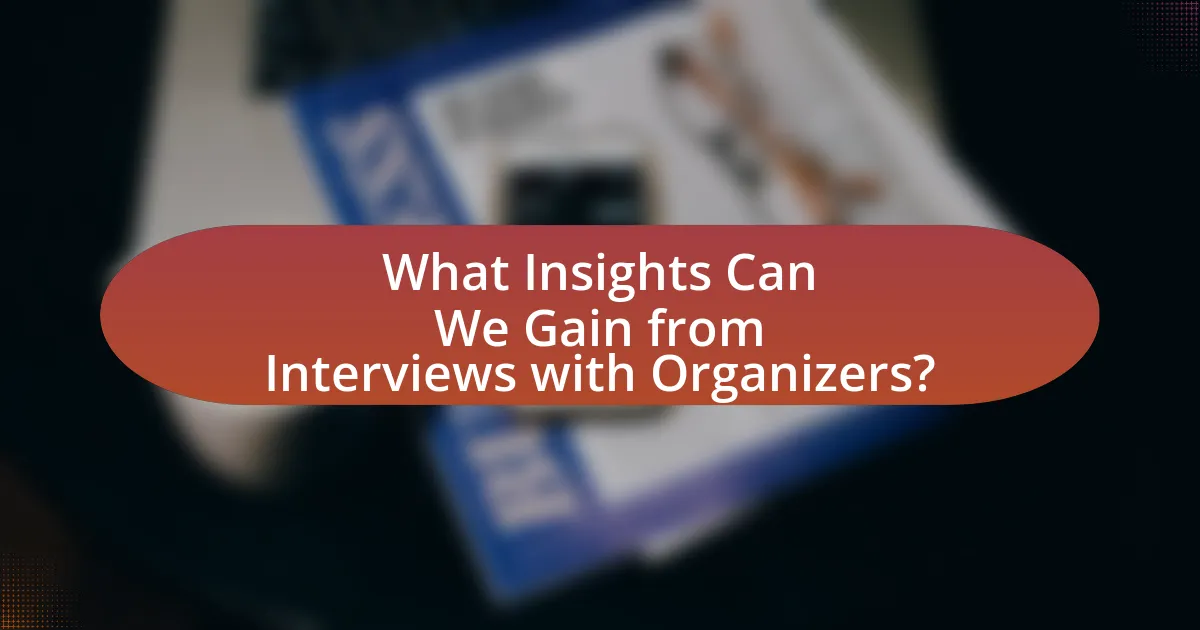
What Insights Can We Gain from Interviews with Organizers?
Interviews with organizers provide valuable insights into effective event planning and execution. These insights include understanding best practices for logistics, audience engagement strategies, and the importance of community involvement. For instance, organizers often emphasize the significance of clear communication and collaboration with local stakeholders, which can enhance event success. Additionally, data from a study by the Event Marketing Institute indicates that 84% of event organizers believe that feedback from past events is crucial for future improvements, highlighting the role of continuous learning in event management.
What common themes emerge from interviews with successful event organizers?
Successful event organizers frequently emphasize themes such as meticulous planning, adaptability, and strong networking. Meticulous planning involves detailed timelines and checklists to ensure all aspects of the event are covered, which is supported by studies showing that organized events have higher satisfaction rates among attendees. Adaptability is crucial, as unforeseen challenges often arise, and successful organizers demonstrate the ability to pivot quickly, a skill highlighted in interviews where organizers recount last-minute changes that led to improved outcomes. Strong networking is also a recurring theme; successful organizers build relationships with vendors, sponsors, and the community, which enhances resource availability and support, as evidenced by testimonials from organizers who attribute their success to collaborative efforts.
How do organizers prioritize tasks during the planning process?
Organizers prioritize tasks during the planning process by assessing the urgency and importance of each task. They often utilize tools such as priority matrices to categorize tasks based on deadlines and impact, ensuring that critical tasks are addressed first. For instance, a study by the Project Management Institute highlights that effective prioritization can lead to a 20% increase in project efficiency. This structured approach allows organizers to allocate resources effectively and maintain focus on key objectives, ultimately contributing to the success of local events.
What innovative ideas have emerged from successful local events?
Innovative ideas that have emerged from successful local events include the integration of technology for enhanced attendee engagement, such as mobile apps for real-time updates and interactive features. For example, events like the South by Southwest Festival have utilized apps to facilitate networking and provide personalized schedules, significantly improving participant experience. Additionally, sustainability initiatives, such as zero-waste policies and local sourcing of materials, have been adopted by events like the Green Festival, demonstrating a commitment to environmental responsibility while attracting eco-conscious attendees. These innovations not only enhance the overall experience but also set new standards for future events.
How do organizers measure the impact of their events?
Organizers measure the impact of their events through various quantitative and qualitative metrics. They often utilize attendee surveys to gather feedback on satisfaction and engagement, which provides insights into the event’s success. Additionally, organizers track attendance numbers, revenue generated, and social media engagement to assess reach and visibility. For instance, a study by Eventbrite found that 78% of event organizers use post-event surveys to evaluate attendee experience, highlighting the importance of direct feedback in measuring impact.
What feedback mechanisms do organizers use to assess success?
Organizers use surveys, interviews, and social media analytics as feedback mechanisms to assess success. Surveys collect quantitative data on attendee satisfaction and engagement, while interviews provide qualitative insights into participant experiences. Social media analytics track engagement metrics such as likes, shares, and comments, offering a real-time gauge of public perception and reach. These methods are validated by their widespread use in event management, demonstrating their effectiveness in measuring success and informing future improvements.
How can data from past events inform future planning?
Data from past events can inform future planning by providing insights into attendee preferences, logistical challenges, and successful strategies. Analyzing attendance figures, feedback surveys, and engagement metrics from previous events allows organizers to identify trends and patterns that can enhance future event experiences. For instance, a study by the Event Marketing Institute found that 70% of event planners use past event data to improve their planning processes, demonstrating the effectiveness of data-driven decision-making. By leveraging this information, organizers can optimize resource allocation, tailor marketing efforts, and enhance overall event execution.
What best practices can be derived from successful local event organizers?
Successful local event organizers prioritize community engagement, meticulous planning, and effective marketing strategies. Community engagement fosters a sense of ownership and participation, leading to higher attendance and support. For instance, organizers often collaborate with local businesses and stakeholders to create a network of support, enhancing the event’s visibility and relevance. Meticulous planning involves detailed timelines, budgeting, and contingency strategies, which are crucial for smooth execution. Research indicates that 70% of successful events have a comprehensive project plan in place, ensuring all aspects are covered. Effective marketing strategies, including social media promotion and targeted outreach, help in reaching the desired audience, with studies showing that events utilizing multi-channel marketing see a 30% increase in attendance. These best practices collectively contribute to the success of local events.
How can collaboration with local businesses enhance event success?
Collaboration with local businesses can significantly enhance event success by increasing community engagement and providing valuable resources. When event organizers partner with local businesses, they can leverage the businesses’ established customer bases, which often leads to higher attendance rates. For instance, a study by the Event Marketing Institute found that events with local business sponsorships saw a 30% increase in participation compared to those without. Additionally, local businesses can offer in-kind support, such as venue space, catering, or promotional materials, which reduces costs for organizers and enhances the overall event experience. This synergy not only boosts the event’s visibility but also fosters a sense of community ownership, making attendees more likely to support both the event and the local businesses involved.
What tips do organizers have for engaging volunteers effectively?
Organizers recommend clear communication as a key strategy for engaging volunteers effectively. By providing detailed information about roles, expectations, and the impact of their contributions, volunteers feel valued and informed. Research indicates that organizations with structured communication plans report higher volunteer retention rates, with a study by the Corporation for National and Community Service showing that effective communication increases volunteer satisfaction by 30%. Additionally, fostering a sense of community among volunteers through team-building activities enhances engagement, as evidenced by a survey from VolunteerMatch, which found that 70% of volunteers prefer organizations that promote social connections.
